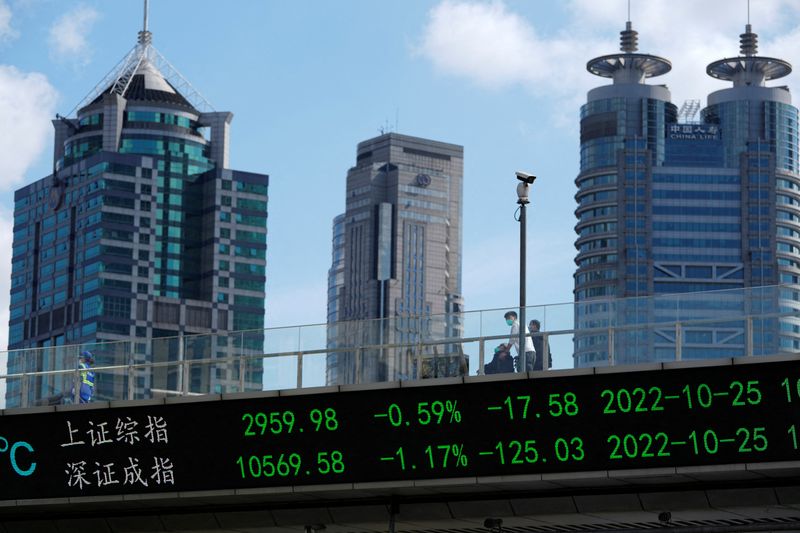By Yantoultra Ngui
SINGAPORE (Reuters) - From India to Singapore, Asia is seeing a boom in private credit funds looking to tap into demand mainly from startups that are moving away from raising equity capital at a sharp discount to their valuations, known as 'down round' in the industry.
At least $2.5 billion in new private credit funds have been launched or planned in the first half of this year targeting startups in a handful of Asian markets, according Reuters calculations based on reported deals and funds interviewed.
The hectic pace of activity comes after private credit funds targeting Asia jumped 76% last year to a record $11.2 billion, driven by both regional and India-dedicated strategies, according to Global Private Capital Association.
Industry watchers say the trend is likely to pick up momentum in the second half of the year as many financial investors take a hard look at traditional equity funding of startups because of global economic and market challenges, and instead increasingly set their sights on private credit funds.
The funds expected to be launched soon include a $1.5 billion fund by Singapore's SeaTown, $150 million India-focused fund by Modulus Alternatives and $200 million Southeast Asia fund by Europe's 21yield, a source and company executives said.
To be sure, private credit isn't cheap, but this funding route has less stringent conditions attached to it than banks and offer an alternative to startups keen to avoid having their valuations scaled back sharply by down rounds.
GROWTH OPPORTUNITY
The upswing in private credit activity in Asia follows a similar trend in the United States where such funds are eyeing fresh opportunities from a potential borrowing squeeze as battered regional banks tighten lending after the turmoil in the sector.
Private debt capital raised in North America totalled $150.1 billon last year, a tripling from $49.2 billion in 2012, according to research firm PitchBook, highlighting the growth opportunity in Asia in this space.
Several major investment and private equity firms are also foraying into the private credit market to fill the chasm created in tech funding, especially debt financing, by the collapse of Silicon Valley Bank in March.
"With the IPO market likely to stay frozen for some time and monetary policy to remain tight ... the relative attractiveness of private debt funds will remain high for borrowers," Nicholas Mairone, analyst at Preqin, said.
As large global sponsors continue to invest into multi-billion dollar Asia-focused credit funds such as Apollo, Blackstone (NYSE:BX) and KKR, the Asian private credit industry is set for further boom, Robert Wright, partner in law firm Baker McKenzie, said.
In comparison, private equity (PE) deals in the Asia-Pacific region excluding Japan has continued on a downward trajectory from last year, as the markets downturn has led to a plunge in startup valuations and dashed hopes of blockbuster listings.
PE-backed deals totalled $66 billion in the first half, down 21% year on year, Refinitiv data showed.
SeaTown declined to comment on it fundraising plan, while Modulus' chief investment officer Rakshat Kapoor said there was good demand for growth as well as replacement capital for mid-size companies with "decent" credit profile.
Referring to its own Southeast Asia-focused private credit fundraising plan, Camille Krejci, CEO at 21yield, said there was a huge financing gap for smaller companies such as startups in Asia.
'DOWN ROUND'
The largest regional private credit funds over the past year have been raised by the likes of Hong Kong-based PAG, Bain Capital, India's Kotak Mahindra Bank, and Hong Kong's ADM Capital.
SoftBank Investment Advisers, which manages two Vision Funds, is exploring launching a private credit strategy that provides debt or debt-like structured financing for late-stage tech startups, Reuters reported last month.
The string of new private credit funds come against the backdrop of startups facing the threat of having down rounds. Asian startups have seen their valuations sky-rocketing in the last few years as marquee equity investors vied to fund them.
Dutch-listed technology investor Prosus (OTC:PROSF) NV has slashed the valuation of troubled Indian edtech startup Byju's to $5.1 billion according to its annual report, a fall of more than 75% from the startup's $22 billion valuation last year.
"There is still a stigma attached to a down round and founders and investors are ... looking at alternative financing options," said Parthiv Rishi, a partner at law firm Sidley Austin.
Nevertheless, alternative financing such as private credit does not come cheap, industry experts warned. Private credit firms usually arrange loans, with assets secured, on a floating rate basis.
"These financing also come with strings attached such as fairly strict covenants on how the company can operate, and this might not be appropriate for certain growth stage companies," said Siew Kam Boon, partner at law firm Dechert.
"Interest rates is also on the rise and companies might also need to provide equity sweeteners."
